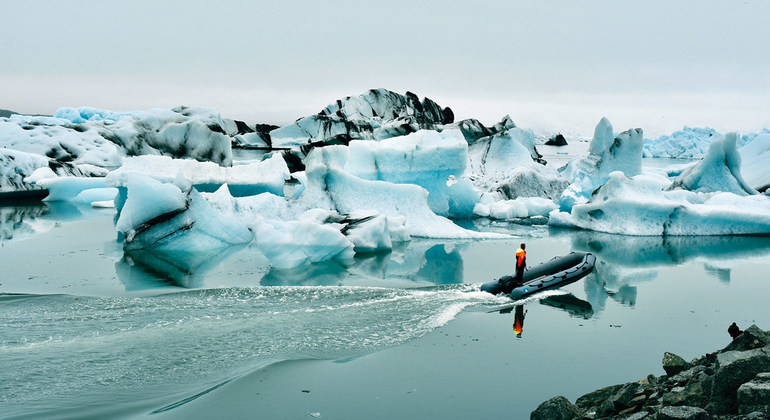“The ocean is warmer, more acidic and less productive”, the report by the Intergovernmental Panel on Climate Change (IPCC) states. “Melting glaciers and ice sheets are causing sea level rise, and coastal extreme events are becoming more severe.”
According to the IPCC report on the ocean and cryosphere – the frozen parts of the planet – global warming has already reached one degree Celsius above the pre-industrial level.
This temperature rise, which the 195-strong Member State body attributes to greenhouse gas emissions, has resulted in “profound consequences” for people and the planet.
“The world’s ocean and cryosphere have been ‘taking the heat’ from climate change for decades, and consequences for nature and humanity are sweeping and severe,” said Ko Barrett, Vice-Chair of the IPCC.
In total, 670 million people who live in the world’s high mountain regions and around the same number in low-lying coastal zones “depend directly” on the planet’s oceans and frozen resources, the IPCC notes.
In addition, four million people live permanently in the Arctic region, and small island developing states are home to 65 million people.
In a bid to protect them, their surroundings and livelihoods, the IPCC is calling for the introduction of measures to limit global warming “to the lowest possible level”, in line with the internationally agreed 2015 Paris Agreement.
“If we reduce emissions sharply, (the) consequences for people and their livelihoods will still be challenging, but potentially more manageable for those who are most vulnerable”, said Hoesung Lee, Chair of the IPCC. “The open sea, the Arctic, the Antarctic and the high mountains may seem far away to many people. But we depend on them and are influenced by them directly and indirectly in many ways – for weather and climate, for food and water, for energy, trade, transport, recreation and tourism, for health and wellbeing, for culture and identity.”
According to the IPCC report, average sea level rise is now 3.6 millimetres a year.
This is more than twice as fast as during the last century and levels could rise more than a metre by 2100 “if greenhouse gas emissions continue to increase strongly”.
The result is likely to be more extreme sea level events that occur during high tides and intense storms. “Indications are that with any degree of additional warming, events that occurred once per century in the past, will occur every year by mid-century in many regions, increasing risks for many low-lying coastal cities and small islands”, the report states.
Without major investments in adaptation, these low-lying zones would be exposed to escalating flood risks, and some island nations “are likely to become uninhabitable”.
Glaciers could shrink 80 per cent, by 2100
Highlighting the importance of coordinated, ambitious and urgent action to mitigate the impact of global warming, the IPCC report also warns that glaciers, snow, ice and permafrost are declining “and will continue to do so”.
In Europe, eastern Africa, the tropical Andes and Indonesia, smaller glaciers are projected to lose more than 80 per cent of their current ice mass by 2100, under worst emission scenarios.
This is likely to increase hazards for people, for example through landslides, avalanches, rockfalls and floods, in addition to farmers and hydroelectric power producers downstream.
“Changes in water availability will not just affect people in these high mountain regions, but also communities much further downstream”, said Panmao Zhai, Co-Chair of IPCC’s Working Group I.
Sea ice getting thinner every month
On sea ice, the IPCC report underscores that the extent of Arctic ice has declined every month, “and it is getting thinner”.
If global warming can be kept to 1.5 degrees Celsius above pre-industrial levels, the Arctic ocean would only be ice-free in September once in every 100 years, the study suggests. At two degrees Celsius, however, this would occur up to one year in three.
“Some people living in the Arctic, especially indigenous peoples, have already adjusted their traveling and hunting activities to the seasonality and safety of land, ice and snow conditions, and some coastal communities have planned for relocation,” the report states.
Permafrost ‘warming and thawing’
Turning to permafrost – ground that has been frozen for many years – the IPCC suggests that it is “warming and thawing and widespread permafrost thaw is projected to occur in the 21st Century”.
Even if global warming is limited to well below two degrees Celsius below pre-industrial levels, around a quarter of the permafrost down to three to four metres depth, will thaw by 2100.
If greenhouse gas emissions continue to increase strongly, there is a potential that around 70 per cent this near-surface permafrost could be lost.
In writing the report, more than 100 authors from 36 countries assessed the latest scientific literature on the ocean and cryosphere, basing their findings on some 7,000 scientific publications.
It will provide input for world leaders gathering in forthcoming climate and environment negotiations, such as the UN Framework Convention on Climate Change Conference (COP25) in Chile, in December.



